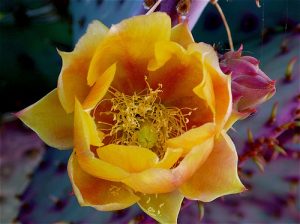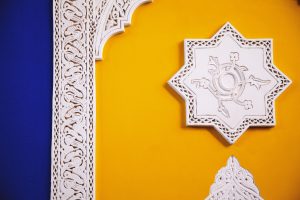|
|
“It’s suffocating,” my mother said. She hated how difficult it was to communicate in English when she knew exactly what she wanted to say in her mother tongue, Arabic. “You’re very lucky you can speak both,” she said. She assumed that my bilingualism meant I had double the number of words to say what I wanted to say, that I could navigate my way in different cultures and contexts. But, I’m just as suffocated. I can only partially articulate my thoughts in each language I speak. I have no native tongue. My speech is not rooted in the geography of my native land, nor does it spring in my exile. I am stranded in the no man’s land in between.
Growing up in post-colonial Egypt, my English was more valued than Arabic, the country’s official language. With most of my education consisting of the white male Western canon, I am for the most part oblivious to any valuable insights that my culture and heritage can give me. I grew up thinking Arabic was the language of the uncultured, the language reserved only for speaking to family, but not a language I would use in a public space where I want to impress. My identity was marked by my utterances. My social capital was largely dependent on my linguistic abilities in English. “We don’t speak Arabic in class,” my teachers would say. At school, students would be chosen for awards based on how well they spoke English. My friends and I would use Franco-Arab, an invented text-language with numbers and English letters to write out Arabic words. All my school and university applications were written in English and my social circle was intricately tied to how well I spoke English. The better I spoke English, and the more often I snuck English words into my conversations, the more educated and sophisticated I seemed. Until I got to university, I didn’t think my bilingualism was coercion, but rather a blessing. After all, I got all the awards, went to the prestigious universities, and was allowed into exclusive English-speaking events.
I only re-evaluated my relationship with bilingualism when I left Egypt. Initially, I didn’t think that moving to Canada with my hybrid language would be problematic. I speak English in public as I’m used to, nothing new. I actually find it funny when someone discovers that I’m an international student and asks “but how is your English so good?” I only noticed the role Arabic played in my life when I started curing my inevitable homesickness by listening to Arabic songs. I would listen to a cheerful song and find myself tearing up over this sense of loss of something I couldn’t really pin down. That sense of loss was accentuated when I started making meaningful connections with people in Toronto. I found myself at a loss of words to express my love to them. I try in vain to translate Arabic expressions to my best friend to explain the emotions I feel. When I once cooked us a meal that she liked I wanted to say “bl hana wl shefa” or “with happiness and health,” but I spent two minutes explaining to her what I meant by something that could be said in two seconds in another language. Alexis Nouss calls this the “outre-langue,” meaning what is lost or imaginary in language (Simon 84). It is an almost universal language behind the mother tongue, beyond what we can articulate. “Outre-langue” is almost non-conscious; we are always dancing around it but not vocalizing it, because we don’t notice it. We recognize it when we can’t put certain things in words, because they belong to a language that is beyond the formally recognized ones, always at the tip of our tongues but still inarticulable. Like a shadow lurking behind me and within me, my elaborate language was beyond language itself. Psychological and cognitive studies prove that feelings, both how we experience them and how we express them, are largely dependent on language and culture. In particular, “emotional vocabulary…gives a certain distinctive shape to [our] feeling” (Besemeres 55). Our brains are developed and socialized in such a way that we experience emotion through certain words. It’s a cyclical process; we understand emotions through languages, and language creates our emotions. That’s precisely why I experience homesickness and love in Arabic. Only Arabic words, like “wahsha” meaning “missing someone or something,” but which is similar to the Arabic word for “ugly,” can possibly encapsulate the hollowness of homesickness. On the other hand, most of my inner thoughts and my life events are in English, mainly because of how I was socialized and because of the extensive role English plays in my life. So, when I try relaying to my family in Arabic events that happen to me in Toronto, I find myself at a loss for Arabic words, repeating English words instead— “filling in my colloquial gaps,” hoping my family would telepathically understand what I mean (Humphrey 75). While bilingualism might seem like a way to break free from this straitjacket of language, it somehow constrains me more by dictating the context in which I can use some phrases and expressions. I’m constantly living in translation. I’m damned by knowing all the different ways I could’ve said something better in a different language. Unlike my mother, I have no way of knowing exactly what I want to say in a single language. I string together bits and pieces from English and Arabic that only I can understand. I can communicate in both, but the language I’m most articulate in is beyond either. But am I always meant to be restrained and suffocated? Despite everything I just said, I believe not. Because of “outre-langue’s” universality, I think we incessantly find ways to overcome language. I belong to my “outre-langue” more than I ever will to either English or Arabic. I recognize what’s missing from my “formal” languages, so I better understand my uncategorizable voice. And even though I can’t claim both languages as my own nor can they claim me as theirs, I combine what I know of them to create a third unique world, one where my meaning is silver-tongued, unbroken, and intact. When I cannot express my love in words, I act it out through a hug. When I cannot translate academic knowledge from English to Arabic, I create scenarios that explain the complexity of the jargon. Even my homesickness isn’t experienced entirely through words, but through rhythm and melody. The twists in my tongue unravel like a polyphony, all the distinctive melodies I utter combine to make a fluid harmony. I breathe in the limitless possibilities that lie in my linguistic fractures.
Works Cited Besemeres, Mary. “Language and Emotional Experience: The Voice of Translingual Memoir.” Bilingual Minds: Emotional Experience, Expression and Representation, edited by Aneta Pavlenko, Multilingual Matters, 2007, pp.34–58. Bensmaia, Reda. “Introduction to Tetraglossia: The Situation of Maghrebi Writers.” Bilingual Games: Some Literary Investigations, edited by Doris Sommer, Palgrave Macmillan, 2003, pp. 87–96. Humphrey, Caroline. “Casual Chat and Ethnic Identity: Women’s Second-Language Use among Buryats in the USSR.” Bilingual Women: Anthropological Approaches to Second-Language Use, edited by Pauline Burton et al., Simon, Sherry. “Crossing Town: Montreal in Translation.” Bilingual Games: Some Literary Investigations, edited by Doris Sommer, Palgrave Macmillan, 2003, |
| Rawan Mostafa is Toronto-based aspiring writer and editor. She loves writing about culture, memories, and life. She has written for online publications such as Society19, Her Campus, and BullshitIst. This is her first venture into the literary journal world. In her spare time, she likes taking photographs, visiting used bookstores, and drinking mango tea. | |

“Tongue Twister”
by Rawan Mostafa
Issue 04


 My tongue is a twisted one. My language is fractured. Each language in its own world. English doesn’t allow me the same intimacy or emotion Arabic does. My only option to express gratitude in English is “thank you,” but I know at least ten different phrases to show gratefulness in Arabic, including “rabena ykhalik leya” which means “I hope God keeps you in my life.” However, I can’t use the academic knowledge I acquired through English when I speak Arabic; all I know about politics, anthropology, sociology, or any other academic field is encrypted only in English inside my head. I wouldn’t be able to transfer the English academic concepts I know into Arabic even if I tried. Similar to the post-colonial Algerian academics in Reda Bensmaia’s “Introduction to Tetraglossia,” I can only write in the language of my colonizers and oppressors, or as Bensmaia says, I “live in several languages and write only in one” (Bensmaia 90). It’s almost as if I’m two different people depending on which language I’m using. I have no mother tongue, only a hybrid language in which my English is stronger.
My tongue is a twisted one. My language is fractured. Each language in its own world. English doesn’t allow me the same intimacy or emotion Arabic does. My only option to express gratitude in English is “thank you,” but I know at least ten different phrases to show gratefulness in Arabic, including “rabena ykhalik leya” which means “I hope God keeps you in my life.” However, I can’t use the academic knowledge I acquired through English when I speak Arabic; all I know about politics, anthropology, sociology, or any other academic field is encrypted only in English inside my head. I wouldn’t be able to transfer the English academic concepts I know into Arabic even if I tried. Similar to the post-colonial Algerian academics in Reda Bensmaia’s “Introduction to Tetraglossia,” I can only write in the language of my colonizers and oppressors, or as Bensmaia says, I “live in several languages and write only in one” (Bensmaia 90). It’s almost as if I’m two different people depending on which language I’m using. I have no mother tongue, only a hybrid language in which my English is stronger. Yet, all my emotions and relationships were experienced in Arabic. Having been raised in a household and a language as intimate as Arabic, time and again, I found English lacking in emotional semantics. I grew up with my mother calling me “hayat albi” or “the life of my heart.” When relatives visited our house, we said “nawarto” or “you lit our house up,” and “‘ash min shafak,” or “seeing you brought life to me.” Most of those emotion-laden phrases made up my understanding of relationships with others and with my own divided self. But I didn’t communicate my emotions in Arabic only. Arabic was there to supplement my writing in English. So, my childhood diary is a mix of English and Arabic words that only a bilingual in both languages would understand. I would have to force myself to not say Arabic words that perfectly fit what I was trying to describe during a class because I couldn’t find an English alternative. And for the most part, I succeeded. I got used to stifling my emotional Arabic side and working in English-only settings.
Yet, all my emotions and relationships were experienced in Arabic. Having been raised in a household and a language as intimate as Arabic, time and again, I found English lacking in emotional semantics. I grew up with my mother calling me “hayat albi” or “the life of my heart.” When relatives visited our house, we said “nawarto” or “you lit our house up,” and “‘ash min shafak,” or “seeing you brought life to me.” Most of those emotion-laden phrases made up my understanding of relationships with others and with my own divided self. But I didn’t communicate my emotions in Arabic only. Arabic was there to supplement my writing in English. So, my childhood diary is a mix of English and Arabic words that only a bilingual in both languages would understand. I would have to force myself to not say Arabic words that perfectly fit what I was trying to describe during a class because I couldn’t find an English alternative. And for the most part, I succeeded. I got used to stifling my emotional Arabic side and working in English-only settings.